Why Is My AC Leaking Water | Tips and Fixes for Home AC Leaks
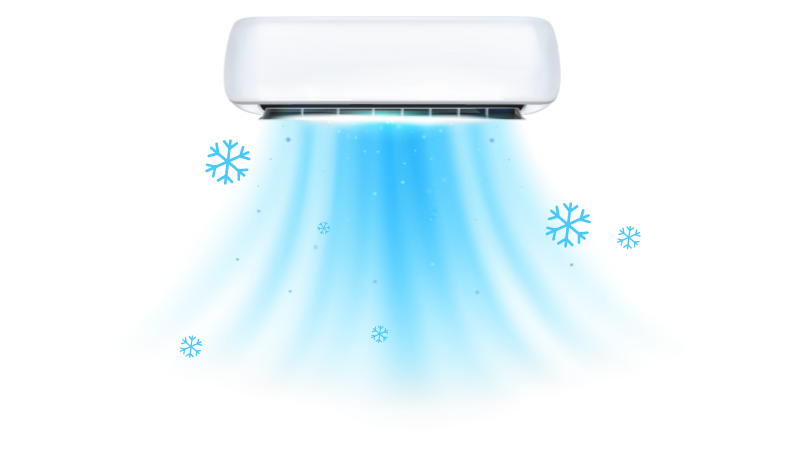
Water leaking from your AC unit can be alarming, but don’t worry! Air conditioner water leaks are common and have easy, quick fixes almost any homeowner can tackle.
When you notice your air conditioner is leaking water, you want to quickly assess the situation, find the source of the leak, and stop it before it gets any worse. Your AC could be leaking water due to condensation, refrigerant leaks, a dirty air filter, or something as simple as a clogged line. The good news is that these AC water leaks can be quick to fix, but you never want to hesitate in case the leak gets worse.
Read on to discover common causes of water leaking from an AC, quick fixes to stop your air conditioner leaking water, and steps to take if the AC is leaking water inside your home. Need more assistance? Shamrock HVAC Services in Maryland is happy to help! Give us a call today for HVAC maintenance, AC inspections, home air conditioner repairs, and more.
Common Reasons Why Water is Leaking From Your AC
While your AC shouldn’t leak water inside the house, water leaks from your AC are not uncommon. This is because AC units have many parts that utilize water drainage and help manage the flow of built-up condensation. In climates as humid as Maryland, it’s common to have an AC leak water.
As a homeowner, there are some easy ways to tell why your AC unit is leaking water inside the house. Once you find the problem, you can easily fix the problem or call for AC repairs in Maryland. Look for these common problems that can cause water to leak from your AC.
Clogged Condensate Drain Line: The most common reason for air conditioner water leaks is a clogged condensate drain line. This line removes the condensation your AC generates, and if it gets blocked, water can back up and leak into your home. Blockages can occur due to a kinked line, disconnect from the output area, or dust or other particles that have built up in the drain line.
Dirty Air Filter: A dirty or clogged HVAC air filter can restrict airflow, causing the evaporator coil to freeze. When the ice melts, it can cause water to overflow from the drain pan and cause water leaks from your AC inside your home.
Low Refrigerant Levels: Low refrigerant can lower the pressure in your AC system, which can also lead to the evaporator coil freezing. The same melting process can cause water leaks in your home.
Damaged or Rusty Drain Pan: If your drain pan is cracked, rusted, or otherwise damaged, it may not be able to collect and drain water effectively. This is a common cause of air conditioner water leaks in the home.
Improper Installation: Incorrect installation of your AC unit can lead to misalignment, causing water to leak out of the system instead of being properly drained. If you have had a new AC installation recently or AC repairs, an improper installation could be the cause of an unexpected AC leak in your home.
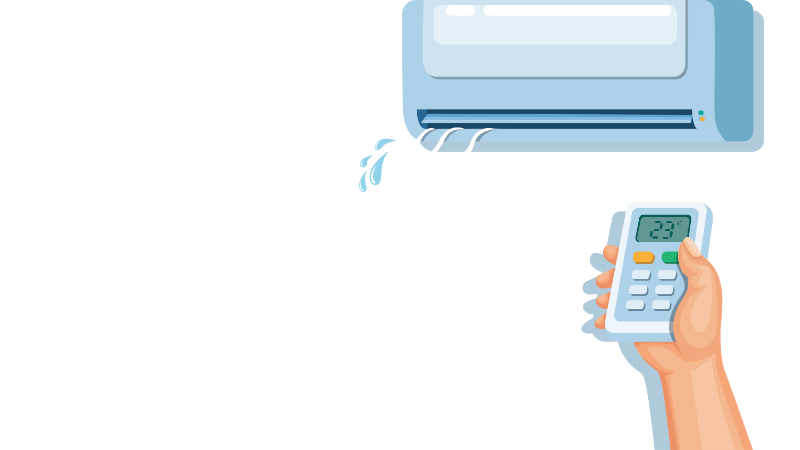
Steps to Take if Your AC Is Leaking Water
If you notice your AC is leaking water, you want to take these actions to stop the water leak from getting any worse. Water leaks left alone can cause flooding, water damage, and could possibly cause a malfunction in your AC unit or HVAC system.
Step 1: Turn off the unit to prevent further water damage and prevent any more leaking
Step 2: Clean up the water to remove any damage from standing water; towels or a wet/dry vacuum can be highly effective
Step 3: Check for blockages in the condensate drain line for clogs to see if this is the source of your AC water leak
Step 4: Inspect the air filter and replace it if it’s dirty to improve AC airflow
Step 5: Examine your drain pan to see if it’s cracked or damaged, allowing water to leak out of the collection area
Step 6: Call a professional if the leak persists and you’re unable to find the cause; water leaks from an AC unit in your home can cause water damage and other issues
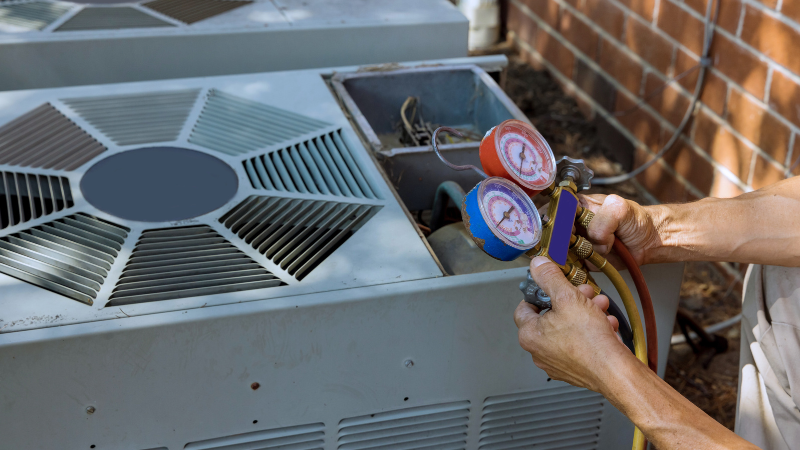
How To Fix Your Air Conditioner Leaking Water Inside Your Home
Turn Off Your AC Unit
Turning off your AC unit is the first step to stopping a water leak from your AC unit. This will allow you to troubleshoot the issue or contact a professional for AC repairs in Maryland. If your AC unit is leaking, do not leave it running.
Replace the Air Filters
Replacing the HVAC air filter is one of the simpler fixes for an air conditioner leaking water. The reduction in airflow is often the cause of most AC water leaks so you can easily troubleshoot your air conditioner water leak by replacing the air filter.
Unclog the Drain Line
Your condensate drain line can back up and cause AC water leaks in your home. To clear any suspected blockages in the drain line, use a wet/dry vacuum to clear any clogs. You can also check for any kinks in the drain line or damages that may be causing the air conditioner water leak in your home.
Inspect the Drain Pan
If the drain pan for your AC unit is damaged, you will want to replace it to prevent further leaks. Look for cracks, damages, missing seals, or any other issues that could be causing the water to drip, leak, or run freely.
Check the Refrigerant Levels
Low refrigerant in your AC unit can cause leaks. While you can check refrigerant levels using a gauge, it’s often best to call a professional when dealing with the refrigerant in your HVAC unit. They can help find the leak, check the levels, and replace anything needed for fast repairs to beat the heat.
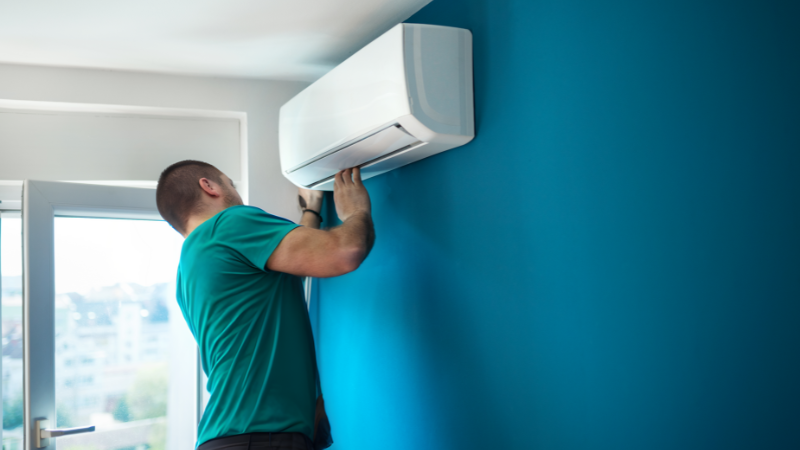
Professional HVAC Services for Fixing AC Leaks
If you’re unsure about checking for AC water leaks yourself, always call a professional to help. Professional AC repairs can help stop and prevent water leaks, ensure a well working unit, and allow you to get back to cool AC living quickly, instead of endlessly troubleshooting repairs yourself while the heat and humidity builds.
Professional AC Repairs:
- Accurately diagnose the problem
- Repair or replace damaged components
- Recharge refrigerant levels
- Ensure AC unit is functioning properly to prevent future leaks
- Regular professional maintenance helps identify issues before they become costly repairs
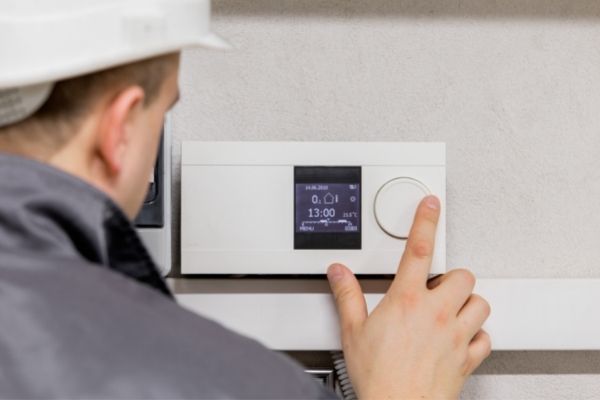
Signs You Have An Air Conditioner Leak in Your Home
Want to get ahead of future AC water leaks in your home? There are some quick steps you can take to ensure your AC unit isn’t leaking without you noticing. Remember, a few minutes of AC maintenance a month can help prevent water damage, AC breakdowns, or other costly repairs.
First things first, look for water pooling around your AC unit, as it’s a clear sign that something is wrong. You may not always notice the leak, but standing water will be an indicator you have water leaking from somewhere.
If you don’t see any water but do notice a musty odor, that’s another sign you have water leaks from somewhere. A musty smell could indicate that water has been leaking for a while and mold is starting to grow. Inspect around your AC unit for any signs of moisture or mold growth.
As always, if your AC isn’t cooling as effectively as before, that’s a sign something is wrong. It might be due to water leakage affecting its performance. Also check for ice on the evaporator coils or refrigerant lines, as these are warning signs of a potential leak or refrigerant issue that you want to have corrected ASAP.
Simple Ways to Prevent AC Leaks
- Schedule regular HVAC maintenance to ensure that your system is clean and functioning properly.
- Change your air filters every 1-3 months to prevent clogs and maintain good airflow.
- Periodically flush the condensate drain line with a mix of water and vinegar to keep it clear of blockages.
- Inspect the drain pan regularly for any signs of rust or damage.
- Ensure your AC unit is installed correctly by a professional to prevent misalignment and potential leaks.

How to Check Refrigerant Levels in an AC Unit
Low refrigerant levels in your AC unit can cause freezing and then melting, which leads to AC leaks in your home. Staying on top of AC maintenance, including monitoring refrigerant levels, is an easy way to prevent AC leaks in your home and help prevent water damage, reduced cooling efficiency, and other damages.
To check refrigerant levels in your AC:
- Turn Off the Unit
- Locate the Service Valve
- Attach a Refrigerant Gauge
- Compare the Readings
Signs of Low Refrigerant in an AC Unit:
- Long Cooling Cycles
- Hissing or Bubbling Sounds
- Ice on the Evaporator Coil
- Warm Air

Help Stop AC Water Leaks Today, Contact Shamrock HVAC Services
Contact Shamrock HVAC Services today for reliable, professional service and peace of mind with your AC repairs. Stop water leaks fast and get back to reliable cooling in your home. We help you beat the Maryland heat.
If you’re dealing with an AC water leak and need expert assistance, don’t hesitate to reach out to Shamrock HVAC Services. Our skilled technicians are equipped to diagnose and fix any AC issues, ensuring your system runs efficiently and your home stays comfortable.
Our quick AC leak tips are designed to get you back up and running, but we are always a call away to help tackle any AC repairs you need.
Read More: Answers to Your Frequently Asked Questions at Shamrock HVAC
Frequently Asked Questions
1. What should I do if my AC is leaking water inside the house?
If your AC is leaking water inside the house, the first thing to do is turn off the HVAC unit to prevent further damage. Next, clean up any standing water to avoid water damage. Check the air filter and replace it if it’s dirty. Inspect the condensate drain line for blockages, and if clogged, clear it with a wet/dry vacuum. If the problem persists, contact a professional HVAC technician to diagnose and fix the issue. Do not run your AC unit if it is continuously leaking water.
2. How often should I replace my AC air filter?
You should replace your AC air filter every 1-3 months, depending on usage and the air quality in your home. If you have pets, allergies, or live in a dusty area, you might need to replace it more frequently to maintain good airflow and prevent system issues. Check your air filter monthly to avoid AC water leaks.
3. Can a dirty air filter cause my AC to leak?
Yes, a dirty air filter can cause your AC to leak. When the air filter is clogged, it restricts airflow, which can lead to the evaporator coil freezing. When the ice on the coil melts, it can overflow the drain pan, causing water to leak from your AC unit.
4. Why is my AC drain pan overflowing?
Your AC drain pan might be overflowing due to a clogged condensate drain line, which prevents water from draining properly. It could also be caused by a frozen evaporator coil that’s thawing, or a damaged drain pan that can’t hold water. Regular maintenance and inspection can help prevent this issue.
Recent Posts

Get in Touch with Shamrock HVAC Services
- 3932A Ten Oaks Rd #F Dayton, MD 21036
- Office: (301) 854-3495
- Fax: (301) 854-3497
- shamrockservicehvac@gmail.com
- Serving Maryland, DC, and Northern Virginia
-

Shamrock HVAC Services has been offering air conditioning and HVAC maintenance services for homes and businesses since 1965. Our mission is simple: provide honest, reliable service that stands head and shoulders above the rest.
➜ Get a $90 Heating and Cooling Check